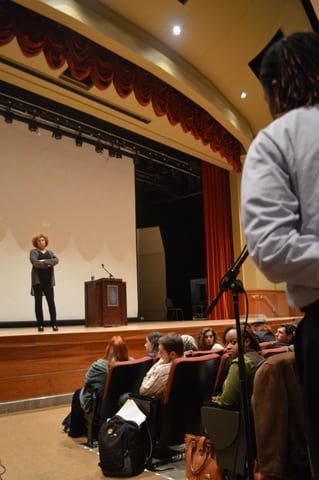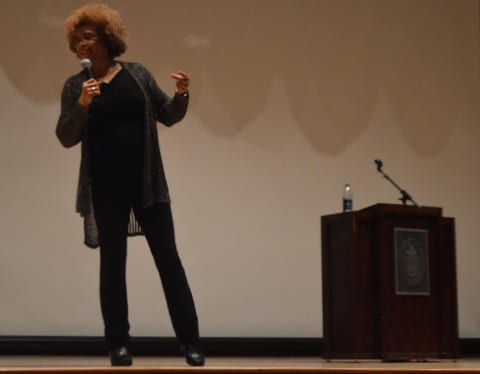Angela Davis tackles issues of race, slavery, imprisonment

Controversial political activist and established educator Angela Davis spoke to a nearly full auditorium Tuesday, Feb. 4, both identifying and describing the role slavery continues to play in American society.
Davis, notorious for her involvement in the United States Communist Party and Black Panther movement, avoided discussing her radical past. Instead, she focused on illustrating the similarities between slavery and imprisonment– namely, the idea of profit from punishment.
She argued with support from authors W.E.B. Du Bois and Douglas Blackmon that slavery did not end with the ratification of the 13th Amendment.
She added that institutions such as the convict-leasing programs of the late 1800s as well as modern-day prison systems demonstrate both the prevalence of slavery and the nation’s inability to adequately address it.
“If we cannot acknowledge our past, as a slave past, then we will never be able to address the issues of mass incarceration and the prison industrial complex,” Davis said.
The phrase “prison industrial complex” was both promoted and popularized by Davis. It is meant to highlight the correlation between demand for labor and rate of incarceration.
Davis went on to say that the U.S. has the largest incarcerated population in the world and, further, that there are more black men in today’s prison system than were enslaved in 1850.
Renski Davis- Buckley, a UT graduate student of social work, explained his attraction to the passionate speaker and her cause.
“Angela Davis has been a social activist for change in America, where being a social revolutionary is given a negative connotation,” said Davis-Buckley, “She sacrificed her reputation, friends and personal opportunities for a greater good.”

Davis, now 70, acknowledged the unlikeliness of witnessing total abolition of prison complexes, her ultimate goal. She did, however, emphasize the importance of a community committed to understanding the past, correcting the present and safeguarding the future.
“You have to act as if it were possible to change the world,” said Davis.
Find more information about Angela Davis and a list of upcoming speakers at http://activities.utk.edu/cpc/issues/.
Edited by Maggie Jones

